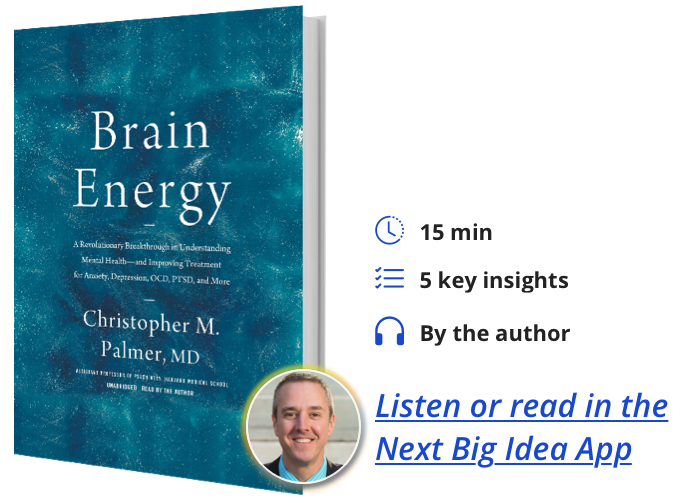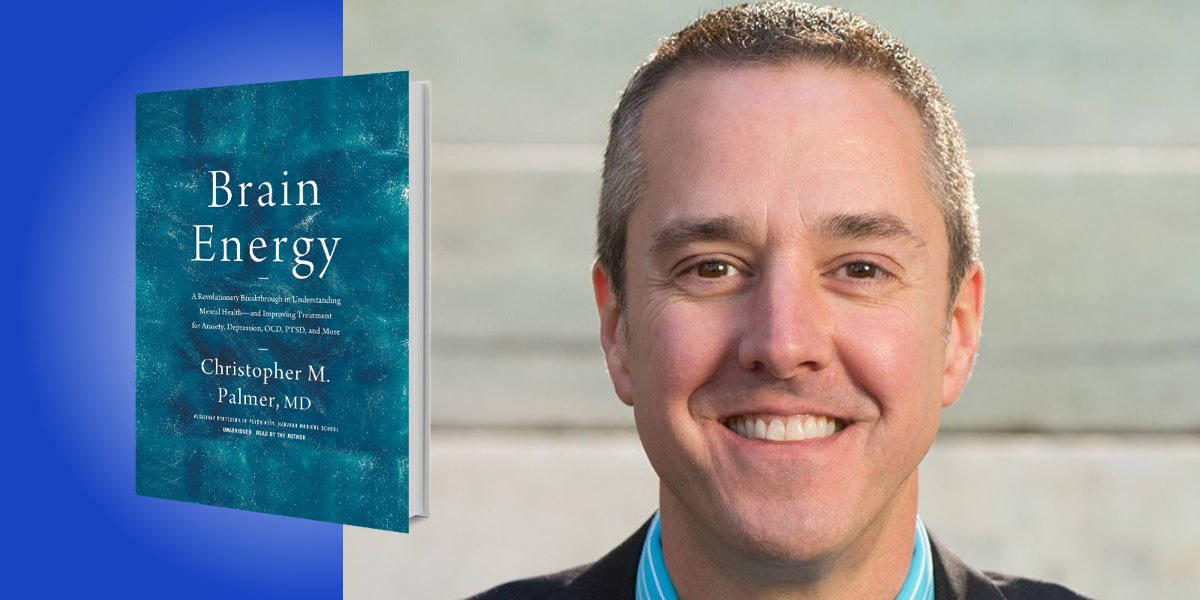Dr. Chris Palmer is a Harvard psychiatrist and researcher working at the intersection of mental health and metabolic health.
Below, Chris shares 5 key insights from his new book, Brain Energy: A Revolutionary Breakthrough in Understanding Mental Health—and Improving Treatment for Anxiety, Depression, OCD, PTSD, and More. Listen to the audio version—read by Chris himself—in the Next Big Idea App.

1. The mental health field is failing.
Mental illnesses are on the rise. They are now the leading cause of disability on the planet. We are struggling to address the issue because no one can answer a fairly basic question: What causes mental illness? Instead, we know some of the factors involved, like genetics, neurotransmitters, hormones, inflammation, trauma, and stress. Without knowing the exact cause of mental illness, we can’t develop better treatments.
That’s where I was as an academic psychiatrist up until 2016, when I had the good fortune to help a patient lose weight. This man was a 33-year-old man with schizoaffective disorder, a cross between schizophrenia and bipolar disorder. He had tried 17 different medications, but they failed to stop his chronic hallucinations and delusions. What’s more, they caused him to gain over 100 pounds. Weighing 340 pounds, he asked for my help losing weight and we decided to try the ketogenic diet. Within two weeks, not only did he begin losing weight, but I noticed significant changes in his psychiatric symptoms. He was becoming less depressed and making better eye contact. Most astonishingly, within six to eight weeks he spontaneously reported that his long-standing hallucinations were going away and that his paranoid delusions were also receding. He began realizing that they weren’t true and probably never had been.
“Within two weeks, not only did he begin losing weight, but I noticed significant changes in his psychiatric symptoms.”
This man went on to lose 160 pounds and has kept it off to this day. But much more importantly, he was able to do things he had not been able to do since his diagnosis. He was able to complete a certificate program and go in public without being terrified because of paranoid delusions. He was even able to perform improv in front of a live audience. I was flabbergasted, so I went on a journey to understand what just happened and how can this help us better understand what causes mental illness.
2. Mental health and physical health are inseparable.
One of the most important parts of this journey is the connection between mental illness and physical illnesses, like diabetes, heart attacks, strokes, obesity, chronic pain disorders, and neurodegenerative disorders like Alzheimer’s disease and Parkinson’s disease. All of these illnesses have strong bidirectional relationships with mental illnesses. What that means is that people with mental illness are more likely to develop these physical disorders, and people with any of those disorders are more likely to have mental symptoms or be diagnosed with mental disorders.
3. Mental disorders are metabolic disorders of the brain.
All of this research led me to conclude that mental disorders are in fact metabolic disorders of the brain. Now, although most people think of metabolism as burning calories (usually as it relates to weight), metabolism is much more complicated than that. It is fundamental to the definition of living organisms because it plays a role in the function of all our cells. When there are metabolic problems in a cell, that cell will not function properly.
“People with mental illness are more likely to develop these physical disorders, and people with any of those disorders are more likely to have mental symptoms or be diagnosed with mental disorders.”
Although this may sound new, in fact it is simply integrating decades of clinical neuroscience and metabolic research. Neuroscientists and psychiatrists have known since the 1940s that people with chronic mental disorders have metabolic abnormalities in their brains and bodies.
4. Mitochondria are the unifying link for mental illness.
Although metabolism is extraordinarily complicated and involves innumerable metabolic pathways, there is one unifying link that helps us understand metabolic problems: mitochondria. Although many people know mitochondria as the powerhouse of the cell, they are so much more.
Mitochondria take food and oxygen and turn it into ATP, which is the energy currency of all cells. That is why they are called the powerhouses of the cell. But they also play a direct role in the production and regulation of neurotransmitters, including ones like serotonin and dopamine. Mitochondria also play a direct role in the production and regulation of important hormones, like cortisol, estrogen, testosterone, and progesterone. Mitochondria play a direct role in the regulation of immune system function and are involved in turning inflammation on and off. Many of you will be shocked to learn that mitochondria play a direct role in the human stress response, and this includes physical stressors, like starvation, but also psychological stressors.
Possibly most importantly, mitochondria play a role in gene expression. They are the single factor most responsible for which genes get turned on or off in our cells. In fact, mitochondria are the only way to connect the dots of mental illness. They connect all the risk factors that we know play a role in mental disorders, and they connect all of the treatments that we know can help. The only way to understand how treatments can help someone with depression is by understanding metabolism and mitochondria.
5. Metabolic treatments can work miracles.
The man that I described in my first insight is not the only patient that I’ve treated using a metabolic approach. In fact, I have treated dozens of other patients with chronic depression, anxiety disorders, OCD, bipolar disorder, and schizophrenia. There are numerous patients around the world who are putting their chronic mental disorders into complete remission, off psychiatric medications, using metabolic treatment strategies. We have a trial of 31 patients with treatment-resistant mental illness, including schizophrenia, bipolar disorder, and chronic depression, all treated with a ketogenic diet. 43 percent of them experienced complete remission of their chronic disorders, and most of the patients ended up on less medication as a result of the treatment.
“Within months, all of her symptoms of schizophrenia were in full and complete remission.”
In case you’re thinking that maybe this is a temporary improvement in symptoms due to weight loss, let me tell you one more story. This is the story of a woman named Doris. Doris has given me permission to use her real name. She was diagnosed with schizophrenia when she was 17 years old. She experienced daily hallucinations and delusions. Over the ensuing decades she tried numerous antipsychotic and mood-stabilizing medications, but they failed to stop her symptoms. She gained a lot of weight from these treatments. She had a guardian appointed by a court. Doris met every definition of schizophrenia. She was tormented by her illness and between the ages of 68 and 70, she tried to kill herself at least six times and was hospitalized for those suicide attempts.
At the age of 70, Doris was referred to a weight-loss clinic at Duke University where they were using the ketogenic diet. Within two weeks, not only did she begin losing weight, but she experienced dramatic reductions in auditory hallucinations. Within months, all of her symptoms of schizophrenia were in full and complete remission. Within six months, she was off all her psychiatric medications and remained in full and complete remission. Doris went on to live for another 15 years, symptom-free, medication-free, out of psychiatric hospitals, no more psychiatrists. She was even able to get rid of the court-appointed guardian because she learned how to take care of herself.
Stories like this don’t happen in psychiatry with current treatments. It is a new day in the mental health field. One filled with hope and possibility.
Now, I want you to understand that the ketogenic diet is not the focus of my book. Instead, Brain Energy takes people on a scientific journey to understand what causes mental illness and the different strategies we can use. Yes, this includes changes in diet but it also includes things like exercise, sleep, identifying and addressing hormonal imbalances or vitamin or nutrient deficiencies, and reducing or managing substance use. There are many strategies to choose from, but what I am convinced of is that most people with mental illness can get better.
To listen to the audio version read by author Christopher Palmer, download the Next Big Idea App today:
































